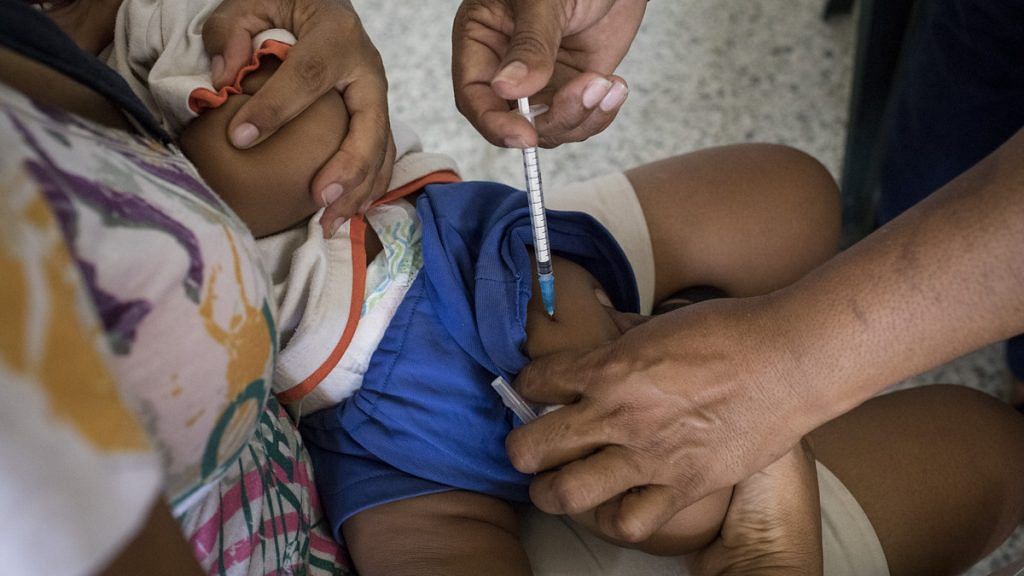At the moment the top priority for most governments around the world is this: to fight COVID-19.
But there are warnings that this focus could create an opportunity for other infectious diseases to spread, as planned vaccinations are suspended. More than 117 million children in 37 countries could miss out on measles vaccinations due to immunization programmes being suspended during the coronavirus pandemic, according to UNICEF.
On the rise
Even before the onset of COVID-19, global health organizations had grown increasingly concerned about the rise of preventable infectious diseases, particularly measles.
Joanna Rea, Director of Advocacy at UNICEF UK, says the trends are worrying:
“Despite having a safe and effective vaccine for over 50 years, measles cases surged over recent years and claimed more than 140,000 lives in 2018, mostly of children and babies – all of which were preventable.”
There are particular concerns about Afghanistan, the Democratic Republic of the Congo, Somalia, the Philippines, Syria and South Sudan – all countries battling measles, cholera or polio outbreaks while simultaneously responding to COVID-19 cases. Annually, about 20 million children are already going without essential vaccinations, according to the UN.
But the problem is wider still. The global rate for childhood vaccinations including diphtheria-tetanus-pertussis (DTP3) and measles has also flatlined at around 86% since 2010; 95% is needed to prevent outbreaks.
And these ‘vaccination gaps’ don’t just affect developing countries; with rising rates of measles due to issues like vaccine mistrust, nations like the US and the UK have been warned they are also at risk.
Also read: Has Covid-19 strain evolved since it was first reported in India? ICMR study to find answer
Vaccinations on hold
The worry now is that the urgent need to fight the global pandemic is going to make matters worse for other diseases.
According to UNICEF, vaccination campaigns have been paused or postponed in 24 countries as local health authorities train all their firepower on the coronavirus. And vaccinations that were planned in another 13 countries may now not take place.
And that doesn’t include recently-born infants who might now miss out on routine immunization services.
Consequences
So how serious could the consequences of missing vaccinations be?
Joanna Rea from UNICEF UK is clear: “Children younger than 12 months of age are more likely to die from measles complications, and if the circulation of measles virus is not stopped, their risk of exposure to measles will increase daily.”
The Global Polio Eradication Initiative (GPEI) has advised countries to delay immunization programmes until the second half of 2020. “We take this decision with deep regret, knowing more children may be paralyzed by polio as a result.”
Tough choices
So, faced with this awful choice, what should governments do?
Pausing routine vaccinations for now is the correct decision, given the need to prevent the further spread of COVID-19, according to the GPEI.
However, the fear is that having won the battle against the new enemy, exhausted health services could be inundated with measles, polio and cholera cases.
“Previous outbreaks have demonstrated that when health systems are overwhelmed, mortality from vaccine-preventable and other treatable conditions can also increase dramatically,” according to the World Health Organization (WHO). In fact, during the 2014-2015 Ebola outbreak, “the increased number of deaths caused by measles, malaria, HIV/AIDS and tuberculosis attributable to health system failures exceeded deaths from Ebola.”
For this reason, UNICEF says the issue is complex, warning that while governments do need to prioritize the coronavirus fight, they must also try to mitigate the impact of older diseases returning. “We urge leaders to intensify efforts to track unvaccinated children, so that the most vulnerable populations can be provided with measles vaccines as soon as it becomes possible to do so,” says Rea.
“Unless we collectively act now to protect children’s education, societies and economies will feel the burden long after we’ve beaten COVID-19,” warns Robert Jenkins, UNICEF’s Global Chief of Education. “In the most vulnerable communities, the impact will span generations.”
This article was first published in World Economic Forum.
Also read: ‘Extremely unusual’ if Covid patients don’t develop antibodies, top US scientist Fauci says
